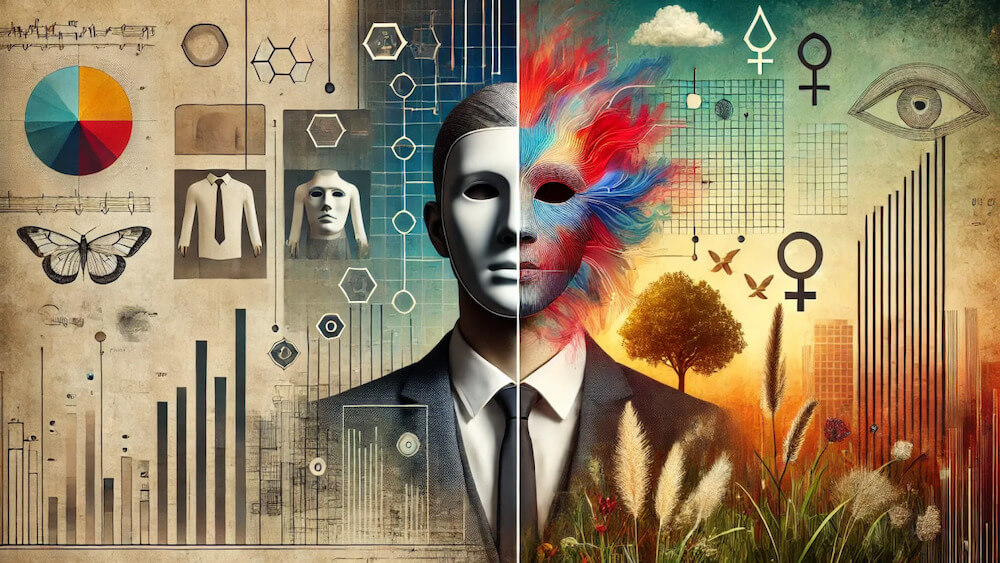
Unmasking: The Journey to Authenticity Across Identities
We’ve all worn masks at some point in our lives—whether to navigate a job interview, fit into a new social circle, or protect ourselves from vulnerability. For many neurodivergent individuals, however, masking is not an occasional act but a constant survival mechanism. While neurotypical people might engage in situational masking, neurodivergent individuals often mask to the extent that it shapes their identity, drains their energy, and affects their mental health. Adding layers like gender, race, and culture further complicates this experience, illustrating how intersectionality plays a key role in masking and recovery.
This article delves into masking from both neurotypical and neurodivergent perspectives, examines the importance of recovery, and explores how intersectionality influences the journey toward authenticity.
What Is Masking?
At its core, masking is the act of suppressing or altering behaviours, thoughts, or emotions to conform to societal expectations. It might look like:
- For a neurotypical individual: putting on a professional persona during work or pretending to be fine during difficult times.
- For a neurodivergent individual: suppressing stimming, mimicking social behaviours, or hiding sensory discomfort to avoid judgment or exclusion.
While masking can sometimes help navigate challenging situations, for neurodivergent individuals, it often becomes second nature—draining and isolating.
The Neurodivergent Experience: A Life Behind the Mask
For neurodivergent individuals, masking is not just about fitting in; it’s often about survival in a world that may not understand or accommodate them. This might include:
- Mimicking facial expressions or body language to appear more “socially acceptable.”
- Suppressing sensory reactions like covering ears during loud noises or avoiding eye contact.
- Hiding special interests to avoid being labeled “obsessive” or “weird.”
While these strategies might help navigate certain environments, they come at a cost:
- Exhaustion: Prolonged masking leads to mental, emotional, and physical fatigue.
- Loss of Identity: Chronic masking can blur the lines between the authentic self and the persona created to fit in.
- Burnout: Without adequate recovery time, the constant effort to maintain a mask can lead to severe burnout, anxiety, or depression.
The Neurotypical Perspective: Situational Masking
Neurotypical individuals also mask, but usually in specific scenarios:
- Adopting a customer-service persona to handle difficult clients.
- Suppressing emotions to maintain professionalism at work.
- Adjusting behaviour to fit into a social group.
While this type of masking can still be draining, it’s typically temporary and doesn’t result in the same level of identity confusion or long-term exhaustion experienced by neurodivergent individuals.
The Importance of Recovery for Neurodivergent Individuals
One of the most overlooked aspects of masking is the recovery time neurodivergent individuals need after prolonged masking. Unlike neurotypical masking, which may not require significant downtime, neurodivergent masking often leads to sensory, mental, and emotional overload.
Recovery time is critical because:
- Mental Health: It helps manage anxiety, stress, and sensory overload.
- Identity Reconnection: It allows individuals to rediscover their authentic selves.
- Energy Restoration: It replenishes the energy drained by constant masking.
Intersectionality in Masking: A Layered Experience
Masking doesn’t occur in isolation—it intersects with other identities like gender, race, and socioeconomic status, creating unique challenges.
- Gender and Masking: Women and nonbinary individuals often face heightened pressure to mask due to societal expectations around emotional labour and social conformity. Neurodivergent women, for example, may feel compelled to appear more empathetic or accommodating, masking traits like stimming or sensory discomfort.
- Race and Culture: Cultural norms can add another layer to masking. Neurodivergent individuals from collectivist cultures might feel obligated to prioritize family harmony over personal authenticity, suppressing their needs to avoid conflict. Additionally, people of colour often navigate biases or stereotypes, making the act of masking doubly exhausting.
- Socioeconomic Status: For individuals from lower socioeconomic backgrounds, limited access to resources like therapy, sensory aids, or supportive communities makes masking a survival tool. However, the lack of recovery options compounds the exhaustion.
The Path to Authenticity
Unmasking—the process of shedding the mask and embracing authenticity—is vital for long-term well-being. Here’s how both neurodivergent and neurotypical individuals can take steps toward authenticity:
For Neurodivergent Individuals
- Start Small: Unmask in safe, trusted environments to build confidence.
- Communicate Needs: Share with loved ones or colleagues how masking affects you and what support you need.
- Self-Compassion: Recognize that masking was a survival mechanism and celebrate your journey toward authenticity.
- Seek Community: Connect with neurodivergent peers who can validate and support your experiences.
For Neurotypical Individuals
- Create Safe Spaces: Foster environments where people feel accepted for who they are.
- Educate Yourself: Learn about neurodivergence and how masking impacts individuals.
- Amplify Diverse Voices: Support and elevate the stories of neurodivergent individuals from marginalized backgrounds.
- Practice Patience: Understand that unmasking takes time and trust.
Masking, while sometimes necessary, often comes at the expense of mental health, energy, and authenticity. For neurodivergent individuals, unmasking is not just a choice but a critical step toward living a fulfilling life. When we bring intersectionality into the conversation, we better understand how layered identities influence the masking experience, recovery needs, and the journey to authenticity.
By fostering inclusivity, supporting recovery, and embracing diversity, we can create a world where everyone—neurodivergent and neurotypical alike—feels empowered to show up as their authentic selves.


